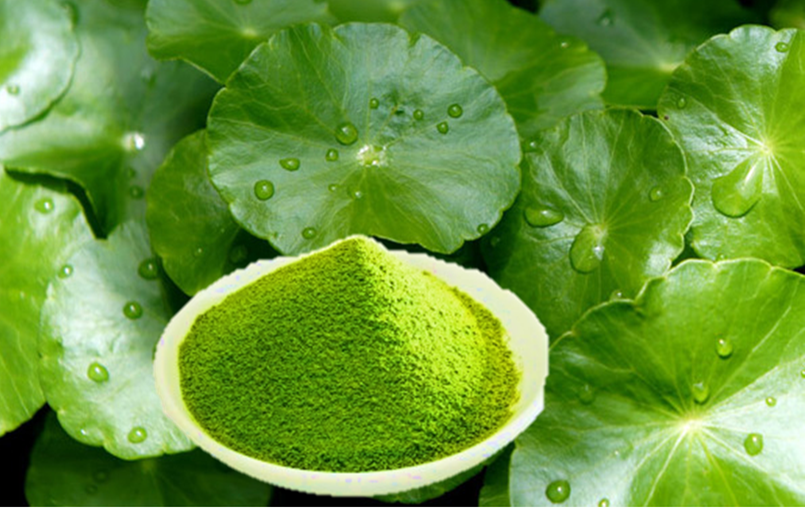News
Công dụng của rau má, Tinh bột rau má – Uses of pennywort, pennywort starch
Công dụng của rau má
Uses of pennywort
Rau má là loại rau chứa nhiều dưỡng chất. Không chỉ làm thức ăn, rau má mà còn là nguồn dược liệu quý giúp điều trị nhiều bệnh. Cách chế biến rất đơn giản, có thể ăn rau sống, xay nhuyễn vắt lấy nước uống hoặc nấu canh. Dưới đây là những công dụng của rau má mà bạn nên biết.
1. Giải nhiệt, hạ sốt, mát gan

Uống nước rau má xay hoặc sinh tố rau má giúp đẹp da, thanh nhiệt cơ thể (Ảnh: Internet)
Rau má là loại dược thảo có tính hàn (lạnh), tân (cay), khổ (đắng) có tác dụng dưỡng âm, thanh nhiệt, nhuận gan, giải độc… Uống nước rau má xay hoặc sinh tố rau má giúp đẹp da, thanh nhiệt cơ thể. Đây là công dụng thường thấy ở rau má được nhiều người biết đến.

2. Chữa các bệnh về đường tiêu hóa
Hoạt tính chống viêm nhiễm và chống oxy hóa của lá rau má có tác dụng rõ rệt trong việc cải thiện sức khỏe của ruột và đại tràng.
Rau má cũng giúp cải thiện đáng kể tình trạng táo bón ở cả người lớn và trẻ em.
3. Hỗ trợ hệ tuần hoàn
Chiết xuất rau má giúp cường hóa thành mạch máu và mao mạch, ngăn ngừa xuất huyết và tối ưu hóa hệ tuần hoàn.
Rau má còn giúp kích thích lưu thông máu, tăng oxy hóa trong các bộ phận cơ thể và các cơ quan nội tạng quan trọng. Từ đó, các bộ phận và cơ quan nội tạng này hoạt động hiệu quả.
Pennywort is a vegetable that contains many nutrients. Not only making food, pennywort but also a valuable source of medicinal herbs to help treat many diseases. The processing is very simple, you can eat raw vegetables, puree them, squeeze them to drink water or cook soup. Here are the benefits of pennywort that you should know.
1. Cool down, reduce fever, cool the liver
Pennywort is an herb with cold (cold), tan (spicy), bitter (bitter) properties that have the effect of nourishing sound, clearing heat, laxatives, detoxifying… Drinking Pennywort juice or smoothies helps to beautify the skin. , clear body heat. This is a common use in Pennywort known by many people.
2. Cure diseases of the digestive tract
The anti-inflammatory and antioxidant activities of Pennywort leaves have a marked effect in improving the health of the intestines and colon.
Pennywort also helps to significantly improve constipation in both adults and children.
3. Circulatory System Support
Centella asiatica extract strengthens the walls of blood vessels and capillaries, prevents bleeding, and optimizes the circulatory system.
Pennywort also helps to stimulate blood circulation, increase oxygenation in body parts and important internal organs. From there, these internal organs and organs function effectively.

Rau má giúp thanh lọc cơ thể (ảnh sưu tầm)
4. Thanh lọc cơ thể
Rau má có thể kích thích cơ thể thải ra các độc tố, muối, nước và thậm chí là chất béo dư thừa trong cơ thể qua đường tiểu. Quá trình này giúp giảm bớt áp lực đối với thận và nhìn chung giúp thải độc tố nhanh chóng, đồng thời vẫn giữ cơ thể khỏe mạnh và cân bằng dịch.
5. Tốt cho những người bị các bệnh liên quan tới tĩnh mạch
Các chuyên gia cho biết, rau má đặc biệt tốt với người bị các bệnh liên quan đến tĩnh mạch. Các thành phần của rau má có thể giúp giảm sưng và lưu thông khí huyết trong cơ thể, đặc biệt tốt với những người bị bệnh các bệnh như suy giãn tĩnh mạch.
In 2001, scientists conducted a study that demonstrated the benefits of Pennywort for people suffering from diseases related to veins. Patients were given a placebo or Pennywort and were monitored for 4 weeks. The results showed that symptoms such as cramps, pain, fatigue, swelling, and leg edema were significantly reduced in the subjects who drank Pennywort.
In addition, the researchers also noted that taking gotu kola about 180mg a day was effective in reducing symptoms related to high blood pressure.
6. Giúp vết thương nhanh lành
Trong rau má chứa triterpenoids – có tác dụng đẩy nhanh quá trình chữa lành vết thương. Đắp rau má giã nhuyễn lên da có thể giảm nhẹ sưng tấy và làm mát vết thương. Đây là phương thuốc cực kì tốt được truyền trong dân gian.

Rau má có công dụng giúp vết thương lành nhanh hơn (Ảnh: Internet)
7. Tăng cường trí nhớ và thị lực
Theo dân gian: Người bệnh lấy 3-5gr rau má sấy khô tán bột, uống chung với sữa. Cách này giúp tăng cường thị lực, khả năng tập trung, hỗ trợ cải thiện trí nhớ.
Ngoài những công dụng trên, rau má còn được dùng để chữa táo bón, vàng da, thổ huyết, tả lỵ, khí hư, bạch đới, mụn nhọt, rôm sẩy.
4. Purify the body
Pennywort can stimulate the body to excrete toxins, salts, water and even excess body fat through urine. This process relieves stress on the kidneys and generally helps to remove toxins quickly, while keeping the body healthy and fluid in balance.
5. Good for people with vein-related diseases
Experts say that Pennywort is especially good for people with diseases related to veins. The components of Pennywort can help reduce swelling and blood circulation in the body, especially good for people with diseases such as varicose veins.
In 2001, scientists conducted a study that demonstrated the benefits of Pennywort for people suffering from diseases related to veins. Patients were given a placebo or Pennywort and were monitored for 4 weeks. The results showed that symptoms such as cramps, pain, fatigue, swelling, and leg edema were significantly reduced in the subjects who drank Pennywort.
In addition, the researchers also noted that taking Pennywort about 180mg a day was effective in reducing symptoms associated with high blood pressure.
6. Helps wounds heal faster
Pennywort contains triterpenoids, which accelerate wound healing. Applying crushed Pennywort on the skin can reduce swelling and cool the wound. This is an extremely good remedy passed down in folklore.
7. Enhance memory and eyesight
According to folklore: Patients take 3-5 grams of dried Pennywort, powdered, and drink it with milk. This way helps to improve eyesight, the ability to concentrate, support to improve memory.
In addition to the above uses, Pennywort is also used to treat constipation, jaundice, vomiting blood, dysentery, bad breath, white blood cells, boils, heat rash.
8. Những lưu ý khi dùng rau má

8.1. Lưu ý khi sử dụng rau má
Rau má là loại rau phổ biến, mang lại nhiều lợi ích cho sức khỏe. Tuy nhiên người dùng không nên lạm dụng. Chỉ nên uống 1 cốc rau má (tương đương 40g rau má) mỗi ngày và không uống quá 1 tháng. Nếu muốn dùng tiếp hãy ngưng ít nhất nửa tháng.
Những phản ứng dị ứng với rau má có thể gặp bao gồm đỏ da, ngứa hoặc phát ban trên da. Người dùng cũng có thể bị đau bụng, buồn nôn hoặc thải ra phân có màu lạ. Dù các triệu chứng này cũng như việc các hợp chất trong rau má phản ứng với nhau rất ít gặp nhưng bạn cũng nên tham khảo ý kiến bác sĩ hoặc dược sĩ trước khi dùng rau má.
8.2. Những người không nên dùng rau má
– Phụ nữ mang thai và cho con bú.
– Những người đang mong muốn thụ thai.
– Người bị tiểu đường: Người bị tiểu đường nên sử dụng ra má ở một lượng vừa phải. Nếu dùng quá nhiều và thường xuyên sẽ làm tăng lượng đường trong máu.
– Những người đang sử dụng thuốc chống trầm cảm, thuốc an thần. Rau má có thể làm giảm tác dụng của thuốc, giảm hiệu quả điều trị bệnh.
8. Notes when using Pennywort
8.1. Note when using Pennywort
Pennywort is a popular vegetable with many health benefits. However, users should not abuse it. You should only drink 1 cup of Pennywort (equivalent to 40g of gotu kola) per day and not for more than 1 month. If you want to continue using, stop at least half a month.
Allergic reactions to Pennywort may include redness, itching, or a rash on the skin. Users may also experience abdominal pain, nausea, or strange-colored stools. Although these symptoms as well as the compounds in Pennywort are very rare, you should consult your doctor or pharmacist before taking Pennywort.
8.2. People who should not use Pennywort
– Pregnant and lactating women.
– Those who are trying to conceive.
– People with diabetes: People with diabetes should use it on the cheeks in a moderate amount. If used too much and often will increase blood sugar.
– People who are using antidepressants, sedatives. Pennywort can reduce the effect of drugs, reduce the effectiveness of disease treatment.
Quote from: Thu Bui (Vietnamese physician)
Trích theo: Thư Bùi (Thầy thuốc Việt Nam)



